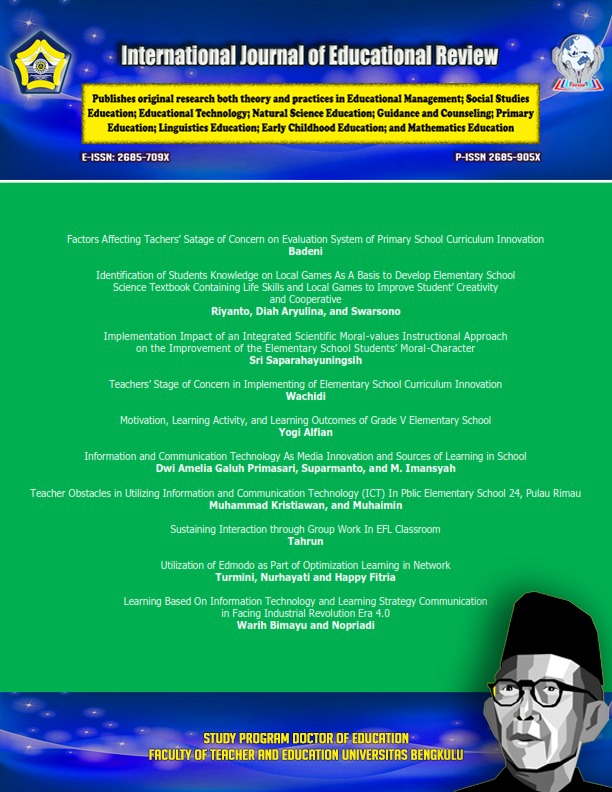The Effectiveness Of The Descriptive Statistics Module In Online Learning In Computerized Accounting Study Program, Banjarmasin State Polytechnic
DOI:
https://doi.org/10.33369/ijer.v4i2.25192Keywords:
Effectiveness, Modules, Online, Descriptive StatisticsAbstract
Module is considered important in distance learning as a self-study guide for students. The importance of module in the learning process because modules can facilitate students in learning independently or face to face. Based on several explanations regarding the importance of modules in distance learning, the authors are interested in examine the effectiveness of using the descriptive Statistics Module in Online Learning in the Computerized Accounting Study Program, Banjarmasin State Polytechnic. The variables observed by the authors in this study were the learning outcomes of groups of students who were given a module and those who were not given a module in descriptive statistics courses. The two variables were carried out a Normality Test with the purpose of assessing the distribution of data in groups of data or variables, whether the data distribution was normally distributed. From the results of the data normality test, a test of the assumption of homogeneity of variance was then carried out to determine the variance of several populations was the same or not. Then a difference test was carried out to test the differences in the group of students who were given the module and the group of students who were not given the module in learning descriptive statistics courses. The data normality test was carried out using the SPSS Kolmogorov Smirnov Test application on the learning outcomes data for descriptive statistics courses for students who were given a module and those who were not given a module yielded a significance value of 0.101. The significance value of 0.101 was greater than 0.05 so it can be concluded that the research data met the assumption of normality. The homogeneity of variance test was carried out by analyzing the significance value of Levene's Test for Equality of Variance where the significance result was 0.466 so it can be concluded that the data had a homogeneous variance. The final stage of this analysis is to test the difference between the learning outcomes data of student groups who were given modules and not given modules by using the Independent Sample t Test. The test results showed a significance value of 0.021 where the significance value was less than 0.05. Thus it can be concluded that the alternative hypothesis (H1) that states that "There is a significant difference between the learning outcomes of groups of students who are given a module and not given a module" can be accepted and verified statistically.
References
Astalini, A., Darmaji, D., Kurniawan, W., Anwar, K., & Kurniawan, D. (2019). Effectivenes of Using E-Module and E-Assessment (pp. 21–39). International Association of Online Engineering.
Hadiyanti, N. F. D., Hobri, Prihandoko, A. C., Susanto, Murtikusuma, R. P., Khasanah, N., & Maharani, P. (2021). Development of mathematics e-module with STEM-collaborative project based learning to improve mathematical literacy ability of vocational high school students. Journal of Physics: Conference Series, 1839(1), 012031.
Halim, A., Mahzum, E., Yacob, M., Irwandi, I., & Halim, L. (2021). The Impact of Narrative Feedback, E-Learning Modules and Realistic Video and the Reduction of Misconception. Education Sciences, 11(4), Article 4.
Handayani, M., Bahit, M., Sunarya, M. H., & Utami, N. P. (2021). Online Learning Evaluation During the Covid-19 Pandemic in Accounting Department of Polytechnic State Banjarmasin: 2nd Annual Management, Business and Economic Conference (AMBEC 2020), Batu, East Java, Indonesia.
Kustijono, R., & Hakim, S. R. (2020). Online-based Learning to Train Students Critical Thinking in Physics Teacher Training Programs. Journal of Physics: Conference Series, 1569(4), 042065.
Kustijono, R., Hakim, S. R., & Wiwin, E. (2020). Online-based Physics Learning to Provide Four Dimensions of Knowledge to Teacher Training Program Students. Journal of Physics: Conference Series, 1491(1), 012063.
Ozarslan, Y., & Ozan, O. (2016). Self-Assessment Quiz Taking Behaviour Analysis in an Online Course. European Journal of Open, Distance and E-Learning, 19(2), 15–31.
Satyawan, I. M., Wahjoedi, W., & Swadesi, I. K. I. (2021). The Effectiveness of Online Learning Through Undiksha E-Learning During the Covid-19 Pandemic. Journal of Education Technology, 5(2), Article 2.
Setambah, M. A. B., Tajudin, N. M., & Adnan, M. (2016). Usability Adventure Statistics Module. Asian Journal of Education and E-Learning, 4(5), Article 5.
Sukestiyarno, Y., Mashitoh, N. L. D., & Wardono, W. (2021). Analysis of Students’ Mathematical Creative Thinking Ability in Module-assisted Online Learning in terms of Self-efficacy. Jurnal Didaktik Matematika, 8(1), 106–118.
Wong, K. H., Allen, A., & Durrani, T. S. (2020). Evaluating Effectiveness of Online Learning Modules in Pediatric Environmental Health Education. Journal of Medical Toxicology, 16(3), 269–275.
Downloads
Published
How to Cite
Issue
Section
License

This work is licensed under a Creative Commons Attribution-ShareAlike 4.0 International License.




